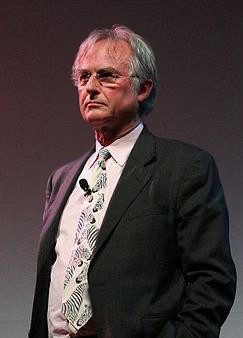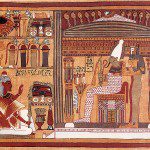
(Public domain photograph by Shane Pope via Wikimedia Commons)
“In all areas except religion,” Richard Dawkins claimed in a blogged panel discussion back in 2010, “we believe what we believe as a result of evidence.” By contrast, he went on to say, religion is “a nonsensical enterprise” that “poisons everything.” It is a “delusion,” he wrote in, well, The God Delusion ([New York: Houghton Mifflin, 2008], 28), a “persistent false belief held in the face of strong contradictory evidence.” According to his fellow New Atheist Sam Harris (Letter to a Christian Nation [New York: Vantage Books, 2008], 230-231), “Faith is generally nothing more than the permission religious people give one another to believe things strongly without evidence.” In his bestselling book The End of Faith, Harris writes
Tell a devout Christian that his wife is cheating on him, or that frozen yogurt can make a man invisible, and he is likely to require as much evidence as anyone else, and to be persuaded only to the extent that you give it. Tell him that the book he keeps by his bed was written by an invisible deity who will punish him with fire for eternity if he fails to accept every incredible claim about the universe, and he seems to require no evidence whatsoever. (Sam Harris, The End of Faith: Religion, Terror, and the Future of Reason [New York: W. W. Norton, 2004], 15)
But is this true? Do Harris and Dawkins themselves supply any evidence to justify their claims? Do Christians, and theists generally, really have no reason at all for what they believe? Are there no theistic philosophers or scientists, for instance, who seriously reflect on their faith and who advance evidence and arguments in support of it? (I won’t keep you in suspense: There are. And more than a few of them. One needn’t accept their arguments in order to acknowledge that they exist.)
In his book The Selfish Gene, Dawkins cites the story of the apostle Thomas – “doubting Thomas,” as he’s often called – to illustrate his assertion that Christianity requires “blind faith.”
You will recall the story: Jesus appears to the disciples after his resurrection, but Thomas is not present on that occasion. Afterwards, he refuses to believe the disciples’ report until, he says, he has seen for himself, and even touched, the risen Lord.
Not long thereafter, Thomas does in fact see, hear, and touch the resurrected Savior, and he believes:
And Thomas answered and said unto him, My Lord and my God.
Jesus saith unto him, Thomas, because thou hast seen me, thou hast believed: blessed are they that have not seen, and yet have believed. (John 20:28-29)
Jesus rebukes Thomas for not believing without seeing. And isn’t that the very definition of “blind faith”?
But there were strong reasons why Thomas should already have believed.
- For one thing, he shouldn’t have been surprised by Christ’s resurrection. After all, as the gospels record, Jesus had predicted it on numerous occasions in his presence and in the presence of other members of the Twelve.
- Second, he had heard eyewitness testimony from people whom he well knew to be good and reliable men (and, presumably, good and reliable women also), who bore testimony to what they had recently seen at first hand and heard and touched. They knew with perfect certainty that Jesus had risen from the dead, and we know that they had told him about it. They spoke with the authority of eyewitnesses. Most of what we know – not only in the study of history but in science – we trust on the authority of others. Yet Thomas persisted in his disbelieving resistance to the well news of the resurrection.
- Third, like the other apostles and disciples, Thomas himself had witnessed miracles wrought by Jesus that should certainly have given him confidence in the Savior’s unique power, status, and authority. The resurrection was, in a sense, merely the latest in a fairly lengthy series of such miracles.
Immediately after the story of “doubting Thomas” – not separated from it by even so much as a single verse — the gospel of John continues, saying,
And many other signs truly did Jesus in the presence of his disciples, which are not written in this book:
But these are written, that ye might believe that Jesus is the Christ, the Son of God; and that believing ye might have life through his name. (John 20:30-31)
Plainly, John presumes that faith can be legitimately based upon written accounts of eyewitness testimony. Richard Dawkins is free to dispute such faith, of course, and to reject those accounts, but his insistence that a faith that is based upon confidence in such ancient reports is flatly blind or ungrounded seems, well, groundless.
Curiously, though, while some atheists deny that there is any evidence for belief in God and that there are no arguments to justify it, there are a few Latter-day Saints (probably not a large number) who profess to believe that no evidence or arguments should be adduced in support of faith. They say – and I promise that I’m not making this up; it’s been said directly to me, both orally and in writing — that faith is not really faith if it’s supported by logic or evidence, and accordingly, that efforts to set forth evidence or to adduce reasoned arguments in support or defense of faith are actually anti-faith.
This seems to me completely wrong-headed.
For one thing, Jesus himself cited this-worldly evidence and used reasoned argument to support a theological claim that is, otherwise, beyond temporal verification:
Say ye of him, whom the Father hath sanctified, and sent into the world, Thou blasphemest; because I said, I am the Son of God?
If I do not the works of my Father, believe me not.
But if I do, though ye believe not me, believe the works: that ye may know, and believe, that the Father is in me, and I in him. (John 10:36-38)
So did the apostle Peter, addressing unbelievers in Jerusalem according to Acts 2:22:
Ye men of Israel, hear these words; Jesus of Nazareth, a man approved of God among you by miracles and wonders and signs, which God did by him in the midst of you, as ye yourselves also know. (King James Version)
Fellow Israelites, listen to these words! Jesus the Nazarene was a man whose credentials God proved to you through miracles, wonders, and signs, which God performed through him among you. You yourselves know this. (Common English Bible)
At Acts 2:20, the apostle Paul points to the natural world itself as a place where evidence about God can be discerned:
For the invisible things of him from the creation of the world are clearly seen, being understood by the things that are made, even his eternal power and Godhead; so that they are without excuse. (King James Version)
Ever since the creation of the world, God’s invisible qualities—God’s eternal power and divine nature—have been clearly seen, because they are understood through the things God has made. So humans are without excuse. (Common English Bible)
And, of course, at 1 Corinthians 15:1-9 Paul famously cites a list of human witnesses to the resurrection of Christ in a bid to convince his audience that the event literally occurred.
And such arguments are scarcely limited to the Bible. Consider the Book of Mormon prophet Alma, confronting the anti-Christ Korihor:
And now what evidence have ye that there is no God, or that Christ cometh not? I say unto you that ye have none, save it be your word only.
But, behold, I have all things as a testimony that these things are true; and ye also have all things as a testimony unto you that they are true; and will ye deny them? Believest thou that these things are true?
Behold, I know that thou believest, but thou art possessed with a lying spirit, and ye have put off the Spirit of God that it may have no place in you; but the devil has power over you, and he doth carry you about, working devices that he may destroy the children of God.
And now Korihor said unto Alma: If thou wilt show me a sign, that I may be convinced that there is a God, yea, show unto me that he hath power, and then will I be convinced of the truth of thy words.
But Alma said unto him: Thou hast had signs enough; will ye tempt your God? Will ye say, Show unto me a sign, when ye have the testimony of all these thy brethren, and also all the holy prophets? The scriptures are laid before thee, yea, and all things denote there is a God; yea, even the earth, and all things that are upon the face of it, yea, and its motion, yea, and also all the planets which move in their regular form do witness that there is a Supreme Creator. (Alma 30:40-44)
This blog entry was inspired by, and draws on, Sean McDowell and Jonathan Morrow, Is God Just a Human Invention? And Seventeen Other Questions Raised by the New Atheists (Grand Rapids: Kregel, 2010), 19-31.
Posted from Park City, Utah













